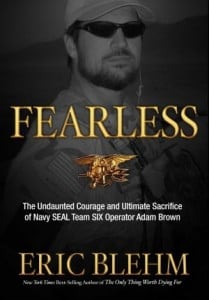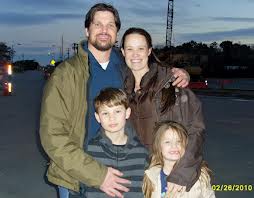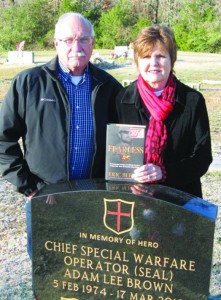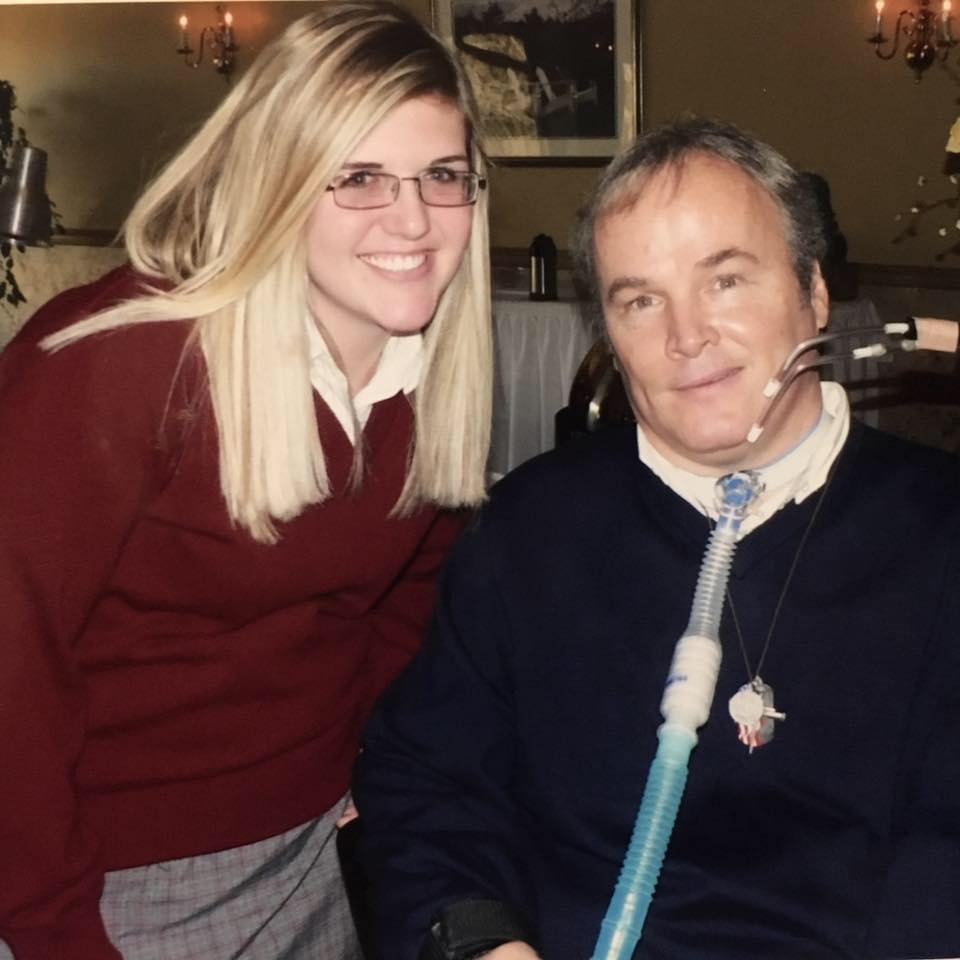 “That was the day that he sold his soul.”
“That was the day that he sold his soul.”
That’s how Eric Blehm, author of the Christopher Award-winning biography “Fearless: The Undaunted Courage and Ultimate Sacrifice of Navy SEAL Team SIX Operator Adam Brown,” described the day that Adam Brown first tried crack.
Taking drugs was an uncharacteristic move for a young man whose childhood was defined by the selflessness and compassion he demonstrated toward others. As Eric told me on Christopher Closeup, “Adam’s parents always led by example and they taught him early on to open doors for people. They said if you see somebody being bullied on the playground and you don’t stand up for them, you’re just as bad as the bully.”
As a result, Adam developed a reputation for looking out for the underdog. One example of his character comes across in a story about a boy with Down Syndrome named Richie Holden. Eric explained, “Some kids were…blocking [Richie] on the way to class, making fun of him without him knowing it. And Adam stood between them. These guys were about a foot taller than Adam, but he said, ‘If you want to pick on somebody, pick on me if you think you’re big enough.’ And Adam’s looking up at these guys – and they backed down, they walked away. Adam put his arm around Richie and walked him to class. From there on out, that kid never forgot who Adam Brown was, even years later.”
The risk-taking side of Adam that came across in his standing up to those taller boys also came out in other ways. Ever the daredevil, he would jump out of trees and do belly flops into shallow water. He generally escaped unscathed, until he took a risk with something he couldn’t control: crack cocaine.
Eric said, “Adam first started failing when he went off to college where he had no friends. All of his good buddies had gone somewhere else and he’d always been this team player. He was big on the football team, he had that community in his high school [in] Hot Springs, Arkansas. It was a little bit of his identity, his moral compass, if you will. When that was gone, that was when he started going down the wrong path.”
Adam got involved with a group of friends and a girl he was trying to impress. They encouraged him to use crack for the first time – and then, the drug owned him.
Eric explained, “Anyone who has any experience with family members that fought that addiction, they realize that drug changes a chemical balance in your brain so you will crave it for the rest of your life…Many never overcome it.”
Adam started stealing from his family in order to buy more drugs, including meth. The good kid from Hot Springs wound up a criminal with eleven felonies. He even stole a hand gun at one point.
His parents, Larry and Janice, who at first didn’t know about this side of Adam, were devastated when it came to light. They wanted to help, but had no choice other than to watch him hit rock bottom.
Though Janice had never gone to church and Larry hadn’t attended in 30 years, Adam’s troubles led them to join a local church and put Adam in God’s hands. Spiritual support from the pastor and prayer community helped the Browns take a “tough love” approach with their son: they had him arrested and he went to jail.
That’s when Adam’s life began its turnaround as well because he found God there and started reading the Bible.
Eric said, “When Adam was recovering [and back from rehab], he would go into church with his parents give his testimony to the congregation. He told these people who had all been praying for him that their prayers had been important, that he’d felt them, that he’d felt that sense of community. Because at the end of the day, you’re very alone in that situation…Knowing that people are rooting for you was so important.”
The person who was there for Adam the most, though, was his wife, Kelley. Adam’s parents called her “an angel” and his friends were astonished that she stuck by him through all his relapses into drug abuse.
Eric said, “She would go and find him in crack houses and bring him back, put him back on his feet, and say, ‘You are better than this.’ We’re talking years of putting up with this type of repeated behavior. She said she would pray to God, if she should stay with this guy or leave him, and she said she never felt in her heart that she should leave Adam. She knew that what was inside, his spirit, was something special. She was a humble warrior herself because she did stand by his side. She ultimately inspired him to try for the Navy. That would be his second chance at life, which was a miracle in and of itself, that he was even given the opportunity to join the Navy.”
It was the depth of character and fortitude that Adam had shown in his past that convinced the Navy to give him a shot. It was in the military that he rediscovered the sense of team that he had been missing since high school. Though he was trained to be a warrior, the tender side of Adam remained ever-present.
 Eric said, “He would go in and distribute shoes to kids in Afghanistan before winter because he saw that they had frostbitten toes and were wearing sandals when winter was coming. He would ask his parents, instead of sending him stuff in his care packages, ‘send shoes, send socks [for the kids].’ The Navy gave him that vehicle to spread that type of a message about Americans, about the American soldier or sailor or SEAL around the world: that he was a compassionate soldier, a person who wasn’t there to only fight with bullets against the so-called bad guys, but he was there to show the locals who he believed a real American is.”
Eric said, “He would go in and distribute shoes to kids in Afghanistan before winter because he saw that they had frostbitten toes and were wearing sandals when winter was coming. He would ask his parents, instead of sending him stuff in his care packages, ‘send shoes, send socks [for the kids].’ The Navy gave him that vehicle to spread that type of a message about Americans, about the American soldier or sailor or SEAL around the world: that he was a compassionate soldier, a person who wasn’t there to only fight with bullets against the so-called bad guys, but he was there to show the locals who he believed a real American is.”
 Becoming a father to his children, Nathan and Savannah, was also one of the joys of Adam’s life. They gave him something special to live for, a responsibility greater than himself. He made sure to coach Little League and teach Sunday School whenever he was home from deployment.
Becoming a father to his children, Nathan and Savannah, was also one of the joys of Adam’s life. They gave him something special to live for, a responsibility greater than himself. He made sure to coach Little League and teach Sunday School whenever he was home from deployment.
Though Eric only came to know Adam through conversations with his family and friends, the author notes the Navy SEAL’s influence on his own life and relationship with his kids. Eric said, “I realized how important it is to give of yourself, and Adam reminded me of that. For the first time, I started to coach Little League. And I’ve been coaching it for a second season. I also hadn’t opened a Bible in 25 years, and I had my own reservations about religion. Adam helped remind me a about the power of faith and the good in religion, not just the negatives that some people associate with it. He really was an example of all that’s right about a strong faith.”
Adam Brown was killed in combat on March 17, 2010, while serving in the Hindu Kush Mountains of Afghanistan. He’d always known the worst could happen, so when he prepared his “last request” letter to his family, Adam asked that his entire life be remembered – the good and the bad.
 Eric explained, “Everybody would have remembered Adam as a success story, and his past could have gladly been put into a box and forgotten. But he said to his parents and wife, ‘If anything happens to me, let people know who I was when I was at my worst, and that might inspire some people to get out of their own dark holes, to seek faith, to find strength in whatever it is that could help them to get through it.’”
Eric explained, “Everybody would have remembered Adam as a success story, and his past could have gladly been put into a box and forgotten. But he said to his parents and wife, ‘If anything happens to me, let people know who I was when I was at my worst, and that might inspire some people to get out of their own dark holes, to seek faith, to find strength in whatever it is that could help them to get through it.’”
Regarding Adam’s legacy, Eric concludes, “Adam could have been dead in a ditch 15 years ago. He overcame and spent another fifteen years serving his country at the highest level and touched so many people’s lives. That gave purpose and meaning to his life, and ultimately, his death. This book is really testimony to his story. I’ve gotten 7,000 letters to myself and the Brown family in just the 11 months since it was released. It was a New York Times bestseller for 17 weeks, got as high as number seven. Then there’s the Adam Brown Legacy Foundation to help people that Adam would have wanted to help. It’s a great example of how a story that’s dark can become light, how somebody can inspire from the grave.”
(To listen to my full interview with Eric Blehm, click on the podcast link:)
Christopher Closeup podcast – Guest: Eric Blehm












